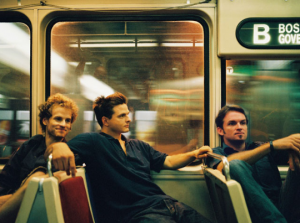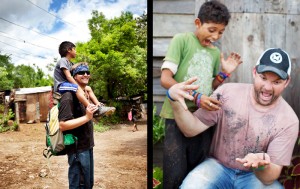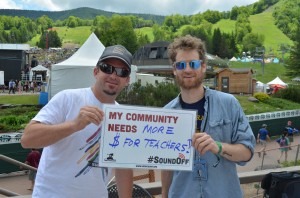Traveling from city to city can get monotonous. But not for Dispatch -- a.k.a. Brad Corrigan, Chad Stokes, and Pete Francis Heimbold. The boys recently sat down with HeadCount's Nashville Team Leader Celia Gregory at the legendary Ryman Auditorium for a wide-ranging interview that touched on playing festivals vs. more intimate venues and and the importance of organizing service projects in the cities and countries they visit. For them, it's all about connecting to their fans and connecting those fans to their own communities in meaningful ways.
HeadCount: You guys are playing a lot of festivals as well as doing a tour. How does it compare, playing a more intimate indoor venue like the Ryman and then a big festival like Wakarusa?
Brad: They all seem to have their own culture for each show. Thankfully we have done a little bit of all of them. We have done some really big outdoor festivals and then this-sized theater is just so special. It’s got to be close to the sweet spot.
 Over the course of your career, you have not only made music, but also made change. How do you feel that intertwines and what compels you to do both simultaneously?
Over the course of your career, you have not only made music, but also made change. How do you feel that intertwines and what compels you to do both simultaneously?
Pete: Today Chad and I went to a high school that was the kind of high school for people that had trouble finishing school -- something could have happened maybe they were bullied, maybe got pregnant, and other difficult situations. What’s cool about getting involved with social service projects is that we can kind of engage our fans and see what they’re interested in, see what they want to do to help the community. I think it’s just a very positive flow of energy that can only help the music.
Oh, absolutely. And it’s a unique opportunity to put your finger to the pulse of not just what you call home, but where your fans call home. (To Chad) I know Calling All Crows does really amazing work. Tell me about the work you do with those guys.
Chad: We’ve done a lot of marriage equality stuff recently. Just getting it out on the street corners before every show with signs: “Honk for gay marriage.” In the past we have done some death penalty stuff and trying to raise awareness for different issues that felt close to home for us. It’s been good seeing some states turn over, too.
Brad: Chad, are you guys working with other bands? Can other people come to Calling All Crows and say: "We have a tour and want to organize service?"
Chad: Yes, and we’ve done some but we would love more bands coming to us being like, “Here’s an issue we are interested in.”
What you spoke about today in Nashville... you’re doing this on a lot of your stops. Is this called an “Alternative Tour?”
Pete: It’s Alternative Break Tour now: 12 kids on a bus following us on our bus, and they are doing service projects every day. We are joining them I think for a bunch of them.
Because you are from different places and you formed a band, you’ve formed other bands and you visit other countries, how do you anchor yourself and what do you call home?
Pete: Home has been, for the last 13 years, New York City. I’m lucky to have a wonderful wife and two little guys.
When you tour and you do so much work abroad, is home a place or is it the people?
Pete: I guess it’s kind of crazy for me to have the family life and the city life.
Brad: I live in Denver, Colorado and I would say home is where my family is. I don’t have a wife and kids as of yet. I have a dog named Stella –she is with my sister and brother-in-law [while we tour].
I was hoping you would say on the bus.
Brad: These guys actually in 2011 brought their dogs as well as their wives, as well as their kids, as well as a mother-in-law. We had an amazing Dispatch family vacation. I have a nonprofit called Love Light and Melody and I went to Nicaragua in 2005 primarily just to play music for kids in an orphanage. Found a bunch of kids living in a trash dump or slum community. I was so blown away to never have seen anything like that before.  The surrounding was so gnarly it was hard to get out of the car, but the kids are so happy and they are kids. I’ve been going down there since then, and in 2007 I founded a nonprofit just to have an umbrella for more organization, really.So two years ago we expanded to Pine Ridge Native American Reservation in South Dakota. It’s really neat. Home is really where you put your heart.
The surrounding was so gnarly it was hard to get out of the car, but the kids are so happy and they are kids. I’ve been going down there since then, and in 2007 I founded a nonprofit just to have an umbrella for more organization, really.So two years ago we expanded to Pine Ridge Native American Reservation in South Dakota. It’s really neat. Home is really where you put your heart.
Chad: Home for me is in Jamaica Plain, Boston. We just bought a house and we are working on it.
Has it always been important to you to be an accessible, approachable and empowering band?
Chad: We have always been very accessible and felt like regular guys, and there wasn’t much of a barrier between me and the audience, so I think that has been a big thing. We didn’t really get on the causes kick until we felt like we were big enough to actually be effective.
Brad: I think, too, it is pretty natural for the three of us when we started playing. It was about meeting people before shows and after shows just as much as it was for making the music. A lot of fans actually turn us on to things we can do.
Now that some of you have kids, does that make your education cause run more deeply?
Pete: Yeah, definitely, because I think we want schools to really care about the kids. Not just love the politics of the situation, but value the people.
Chad: We need to value those teachers.
Brad: They are shaping our culture, for sure, but I don’t think any of us really get it. We have expectations that they’ll work 50-hour weeks, and have 30 and 40 kids in their classroom. That’s crazy.
Thank you guys. HeadCount always enjoys being at your shows. Any parting words?
Pete: We hope that people get together, love one another, love the teachers, and jam.
Brad: FoodDemocracyNow.org -- this is a website I’ve recently been checking out, and it’s so interesting.
Chad: Educate yourselves!
Thank you, guys!
